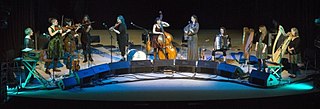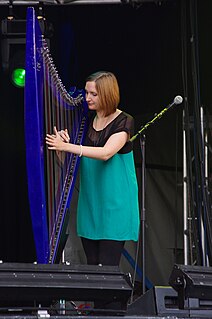
The Peatbog Faeries are a largely instrumental Celtic fusion band. Formed in 1991, they are based in Dunvegan on the Isle of Skye, Scotland.

Brian McNeill is a Scottish folk multi-instrumentalist, songwriter, record producer and musical director. He was a founding member of Battlefield Band which combined traditional Celtic melodies and new material.
The Scots Trad Music Awards or Na Trads were founded in 2003 by Simon Thoumire to celebrate Scotland's traditional music in all its forms and create a high profile opportunity to bring the music and music industry into the spotlight of media and public attention. Nominations are made by the public and in 2019 over 100,000 public votes were expected across 18 categories.

Mellowosity is the debut studio album by Scottish Celtic fusion group Peatbog Faeries, released in 1996 on Greentrax Recordings. After forming as a vocal-based Celtic rock group in 1994, the duo had settled into becoming an instrumental Celtic fusion group by the release of Mellowosity. The album draws from a wide range of musical styles and influences including jazz, reggae, afrobeat, rock, Eastern music, dub and funk, that are mixed in with the band's traditional Scottish folk/Celtic sound featuring fiddles and bagpipes.

Faerie Stories is the second album by Scottish Celtic fusion group Peatbog Faeries, released in 2001 on Greentrax Recordings. The album was reissued in 2008 as a digipack. The album is large departure from the sound of their début album Mellowosity (1996), and sees the band explore a largely electronic sound mixed with their traditional Celtic fusion sound. Influences of electronic genres such as electronica, house, dubtronica and trip hop, in addition to even dub music and African music can be heard on the album fused with traditional Scottish Celtic music.

Welcome To Dun Vegas is the third album by the Scottish Celtic fusion group Peatbog Faeries, released in July 2003 as the first release on the band's own Peatbog Records label. The album was recorded in a cottage on the banks of Pool Roag, near Dunvegan, on the Isle of Skye. Following the electronic-infused Faerie Stories (2001), Dun Vegas was co-produced between Calum MacLean and the band's drummer Iain Copeland. The album is experimental, mixing traditional and modern Celtic music with other genres and styles such as African music and electronica and featuring experimental effects including backwards drumming and a track based around a kitchen cooker timer.

Croftwork is the fourth album by Scottish Celtic fusion group Peatbog Faeries, recorded in Roag on the Isle of Skye, and released in 2005 on the band's own Peatbog Records label. It was released as the label's second album following on from the band's previous album Welcome to Dun Vegas (2003). They recorded the album at Phat Controller Productions on the band's native Isle of Skye.

What Men Deserve To Lose is the fifth album by Scottish Celtic fusion group Peatbog Faeries, recorded at Skye Recording in Roag on the band's native Isle of Skye in 2007, and was commercially released on 16 July 2007 on the band's own label Peatbog Records, though the album had been sold at festivals, and from the band's website, since 22 June 2007. It is the band's first album to feature Graeme Stafford, who brings what the band described as a "dancey" feel to the album.

The Carolina Chocolate Drops is an old-time string band from Durham, North Carolina. Their 2010 album, Genuine Negro Jig, won the Grammy Award for Best Traditional Folk Album at the 53rd Annual Grammy Awards, and was number 9 in fRoots magazine's top 10 albums of 2010.

Arrogance Ignorance and Greed is the fourteenth studio album by English folk duo Show of Hands. Released in 2009 on the band's label Hands on Music, the album was produced by Stu Hanna of the English folk duo Megson, with additional production by Mark Tucker. The album followed an emotionally painful period for Steve Knightley where members of his family battled serious illnesses. This led to the album becoming particularly personal and darker than previous Show of Hands albums, aided by Hanna's direct and sharp production. The album also discusses several social and political concerns, and contains several collaborations with other musicians and vocalists.
Ewen Thomson is a Scottish luthier, specialising in violins, violas and cellos.

O'Hooley & Tidow are an English folk music duo from Yorkshire. Singer-songwriter Heidi Tidow performs and records with her wife, singer-songwriter and pianist Belinda O'Hooley, who was formerly a member of Rachel Unthank and the Winterset. O'Hooley & Tidow were nominated for Best Duo at the 2013 BBC Radio 2 Folk Awards. Their 2016 album Shadows was given a five-star review in The Guardian, and four of their other five albums, including their 2017 release WinterFolk Volume 1, have received four-star reviews in the British national press. In 2019 their song "Gentleman Jack", from the album The Fragile, featured as the closing theme for the BBC/HBO television series Gentleman Jack.

Dust is the sixth studio album by the Scottish Celtic fusion band Peatbog Faeries, released on 8 August 2011 on Peatbog Records, although pre-release copies were released on 20 July 2011 through the band's online shop. Following the band's 2008 tour and subsequent live album, the band's fiddle player Adam Sutherland and drummer Iain Copeland left the band, replaced by Peter Tickell and Stu Haikney respectively whose experience helped stir the band in a new direction. The band set to record Dust in 2011 with longtime producer Calum MacLean, beginning work in Orbost and concluding work at Cumbernauld College. Haikney brought experimental fiddle techniques to the band, and similarly experimental production techniques, whilst the entire band experimented with various genres of music including African music, funk, reggae, ambient music and electronic music alongside the band's traditional Celtic fusion sound. The brass sound of previous albums also returned. The album was also an attempt to translate the band's live sound to studio work.

Hatful of Rain, an acoustic music group from Brighton and Shoreham-by-Sea, Sussex, England, perform original material that combines English folk sounds with harmony singing and American bluegrass music. Critically acclaimed, the band came to the attention of broadcaster Mike Harding, who played their music on his BBC Radio 2 show. The band also performed live on BBC Radio 2's Bob Harris Sunday programme on 24 March 2013.

Kara were a folk music group from Hertfordshire, England, whose music has been called "spirited acoustic folk with a Russian twist". Their debut album, Waters So Deep, was acclaimed by The Daily Telegraph.
Jamie Freeman is an English singer, songwriter, musician and record producer, who previously fronted The Jamie Freeman Agreement. He is the brother of the actor Martin Freeman and the musician Tim Freeman. He co-founded Union Music Store in Lewes, East Sussex with his ex-wife Stevie Smith. He is a member of the Americana Music Association (Nashville) and Americana Music Association UK. His song 'The Fire' - co-written with Ben Glover - was nominated for UK Song Of The Year at the UK Americana Awards.

Look Both Ways is an album by Steamchicken, and their first with lead vocalist Amy Kakoura. It was released on 10 March 2017.

Zoë Bestel is a Scottish singer-songwriter, who describes her music as Nu-Folk. She started learning the Ukulele in 2011 and released her first EP in 2012. Bestel has released two albums, been nominated for the Scottish Alternative Music Awards under the Best Acoustic category and supported artists such as Nathan Connolly of Snow Patrol, Emily Smith, The Paul McKenna Band, The Peatbog Faeries, Erin Rae, Chris Wood, Paul Brady, Steve Tilston and Bella Hardy.

Songs of Separation was a music project created in the aftermath of the 2014 Scottish independence referendum to explore through the medium of music ideas of separation. It was organised by double-bass player Jenny Hill and brought together ten female folk musicians from Scotland and England for one week in June 2015 on the Isle of Eigg. The resulting album won the "Best Album" category in the 2017 BBC Radio 2 Folk Awards.

Rachel Newton is a Scottish singer and harpist. As well as playing both acoustic and electric harp she also plays viola, fiddle, piano and harmonium. She performs solo as well as in the bands The Shee, The Furrow Collective and Boreas and was formerly a member of the Emily Portman Trio. She was a member of the Lost Words Spell Songs project and is a co-founder of The Bit Collective, a group campaigning for equality in folk music.



















